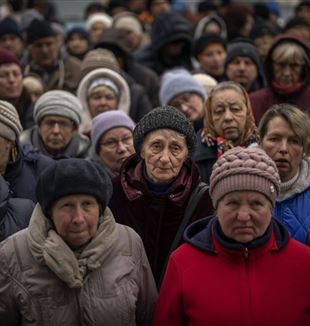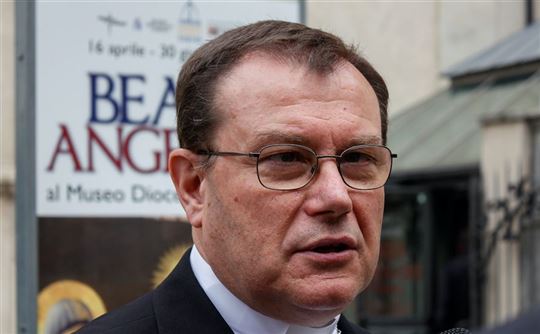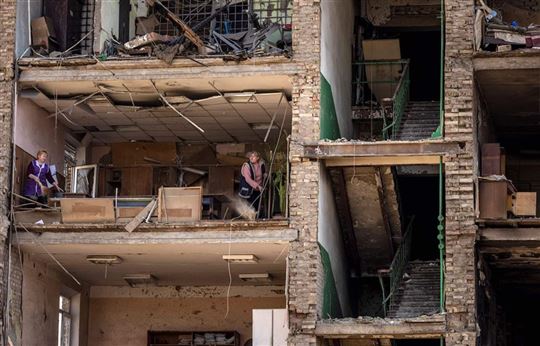
Monsignor Paolo Pezzi: War and us
The possibility of light in the dark night of humanity, the need for forgiveness, the Magdalene’s desire, and Pope Francis. From the May issue of Tracce, a dialogue with the Archbishop of the Mother of God in Moscow."A heart that lives for peace is stronger than the atomic bomb." More than two months after the beginning of the conflict, Monsignor Paolo Pezzi sums up what is happening thus: "I think of that expression of Fr. Giussani: 'The forces that move history are the same that make a man happy.'" Thus an inseparable relationship is established between great world events and a possibility that is rooted in us every day. "Peace begins in the heart, welcoming the 'peace' that is Christ. Those who have this courage become irresistibly contagious."
Pezzi has lived most of his life in Russia, first arriving as a missionary in Siberia in 1993. Fifteen years ago he was appointed by Pope Benedict XVI to lead the Archdiocese of the Mother of God in Moscow, some seventy thousand faithful in an expansive territory, now plunged into horror. In this dialogue with Traces he speaks of his hope.
How does what is happening challenge you? What has been imprinted on your heart since the beginning of the war?
I was immediately challenged by grief. A deep pain, aroused by the drama experienced by people, especially the most helpless and defenseless. I wonder why it has come to this, and what God wants to say to us through it all. Then the accounts of the refugees, who in a few hours had to leave everything behind, not knowing if they would see it again, is very touching. This provokes the need in me to say "yes" again to Christ in the condition I am in. It has made me even more grateful for my vocation, and made me look at the people and things I have in a new way.
At the beginning of the conflict, you said that "for peace we must not first of all do something, but notice something”: "flames," "details that have cosmic reach, because they have the power to overcome darkness." Can you elaborate on this?
In chapter 14 of John's Gospel, which we reread in Holy Week, Jesus at one point in his farewell speech speaks of "his" peace, which is not like the peace the world understands. Jesus' peace is something to be recognized and welcomed, not "made." This peace is a Child, who became a man and died on the cross to ensure that this peace has a cosmic and historical scope. But this man "remains" a particular, concrete man, Jesus of Nazareth, who also has cosmic reach: "When I am lifted up from the earth, I will draw all men to me." Each baptized person participating in the life of the risen Christ becomes a flame of hope for all. I was recently in the north and on a completely dark, pitch black night, at one point one, two, three, a thousand stars appeared. They were able to brighten that night. The pitch blackness had no obstacle to oppose.
Where do you notice this real hope?
That night I thought of the many who by their gratuitousness testify to me that they are these flames. In particular I thought of some children and young people with Down syndrome who I spend time with from time to time, and of a disabled person who during the penitential liturgy preceding the Act of Consecration to the Immaculate Heart of Mary on March 25 came to me for confession. I ask to have that purity of heart of his, that cordial entrustment into God's hands.
With regard to the Consecration to the Immaculate Heart of Mary, you defined that gesture first and foremost as a "recognition." What does that mean?
The consecration to the Immaculate Heart of Mary would remain a "pietistic" act, beautiful, good, but inconsequential on history, if it did not start from the recognition of what Our Lady said to the shepherd children of Fatima: "My immaculate heart will triumph." But what is the triumph of the heart for a Mother? May all recognize that they are promised and destined for the Son. After all, on the cross, Jesus’ penultimate gesture is to “offer” the Mother to John, and John to the Mother. In this act of entrustment it is as if Mary "begets" all humanity anew.
The Pope's outlook on the conflict is easily reduced or interpreted. What do you see in Francis' position? And how can we identify with his gaze?
Pope Francis sweeps us off our feet, that's what I see. He always seems to be interested in touching the core of the issue. And does everything possible to not give up on that. Just think of how he dealt with the conflict between the South Sudan rulers, both Christian sides. To convince them to dialogue, he didn't tell them to remember they were Christians, but he prostrated himself and kissed their feet. During this time, to identify with his gaze I am helped by the words he himself spoke on his trip to Iraq a year ago: "From where, then, can the journey of peace begin? From the decision not to have enemies. Anyone with the courage to look at the stars, anyone who believes in God, has no enemies to fight. He or she has only one enemy to face, an enemy that stands at the door of the heart and knocks to enter. That enemy is hatred. While some try to have enemies more than to be friends, while many seek their own profit at the expense of others, those who look at the stars of the promise, those who follow the ways of God, cannot be against someone, but for everyone. They cannot justify any form of imposition, oppression and abuse of power; they cannot adopt an attitude of belligerence.”
You recently said that "the most despairing defeat of war" is the extinguishing of the flame of desire, "the exhaustion of the desire of expectation, of the yearning for peace." And you focused your attention on the Magdalene. Why?
For the disciples, the cross is a defeat, or at least the exhaustion of waiting; there is no more room to wait, and the two discouraged disciples who go home to Emmaus are emblematic of this exhaustion. This was not the case for the Magdalene. For her, the cross did not dry up her longing, and, as a Hymn of the Byzantine tradition beautifully commented on by Olga Sedakova says, her tears are not bitter (gor'kie), but burning with longing (gorjačie). I see this flame in the many Magdalenes of this time: men and women who do not resign themselves, but carry a proclamation of hope that is greater than themselves. It is the consciousness of being carried by the One who carries us, as a nun used to say to her sisters. Even the great Pasternak in astonished by the Magdalene in Doctor Živago: "I have always wondered why Mary Magdalene is mentioned on the very eve of Easter, just before the death and resurrection of Christ. I don’t know the reason for it, but this reminder of what life is seems so timely at the moment of His taking leave of it and on the eve of her resurrection.... Thus she prays to our Lord, ‘Unbind my debt as I unbind my hair.’ Could any expression of repentance, of the thirst to be forgiven, be more concrete, more tangible?”
Where have you rediscovered the living Christ in these weeks?
First, in the silence before the Blessed Sacrament every morning. And then in the gratuitousness of friends, and even people I do not know directly. This requires that I set my freedom in motion every morning, and this is by no means a given. It is necessary to reflect on what makes me free. Václav Havel in his unforgettable The Power of the Powerless speaks of the "freedom" of the greengrocer, who simply does not put party-mandated slogans on the price tags of fruits and vegetables. Now, without wishing to deny that any restriction of expression reduces freedom, I think the evangelical "the truth will set you free" is always the most interesting viewpoint: seeking the truth leads to recognizing Christ.
In this time you called sharply for "risk on forgiveness," because the folly of war "can only be won by another folly, that of God." You said that we need forgiveness more than air, because it is the breath of the soul." What makes this possible?
This year, on the day I celebrated Mass in Moscow on the occasion of the recognition of the Fraternity of CL and the anniversary of Fr. Giussani's ascent to heaven, the readings of the liturgy recalled God's mercy. A few days earlier the military operation in Ukraine had begun, which no one expected or thought would last long. During the sermon I recalled that forgiveness and mercy will no longer be there in Heaven, only charity will remain. But mercy and forgiveness are needed for us now, in history. Forgiveness is a fact.
What does that mean?
It is a fact: "I absolve you." "I forgive you." Otherwise we would not have the power to overcome another terrible fact like sin, wickedness, hatred, war. You cannot defeat a fact with an idea, you need another fact, an event. During my military service, some fellow soldiers used to play "morra sarda," or at least that's what they called it, in which you throw things down with your hands: the open hand symbolizes paper, the closed hand symbolizes stone, and the V-shaped fingers symbolize scissors. It struck me that according to the rules, paper wins over stone, because although it is far more fragile, it envelops and overcomes it. To experience forgiveness one must have experienced this "enveloping," this embracing, like the embrace of the son found and forgiven in Rembrandt's beautiful painting in the Hermitage in St. Petersburg. It is simply amazing when you see this in the face of a poor man who comes back to the church for confession after years and years, and, like the prodigal son, expects not forgiveness, but just punishment. Instead, he comes out of the confessional and approaches the Eucharist!
How are your people experiencing this moment, the responsibility in the face of what is happening, the many loved ones in Ukraine, the tearing apart of relationships? The consequences of the conflict are there, both for those who decide to leave and for those who stay....
For me, and, I am convinced, also for our faithful, our responsibility is to live communion: to live a unity stronger than opinions. This communion is expressed in acts of gratuitous charity. This responsibility then becomes a testimony that proclaims this mutual love, reaching even forgiveness. Outside of this perspective, I believe that any decision to leave or stay, to do one thing or another, is only a source of remorse or regret that helps no one.
In addition to the pain of the dead and refugees, there is pain caused by ideology....
I don't think ideology causes pain. It causes anger, fanaticism, suffering in others, always and only in others. One feels pain instead for the death of a person, for suffering, for injustice... And this pain is not opposed to faith, but is a way of "sharing" faith and hope with those who die, suffer, are persecuted.
Do you see signs of freedom and building, even in oppression?
I see the bud of a life that does not succumb every time I see Jesus say to the widow "woman, do not weep," every time I see Jesus sobbing over the misery and destruction of lives. And Jesus, believe me, does many of these miracles in people, or in "moments of people" in the Christian community, especially. I see compassion, sharing, a possibility of building. As the Benedictines used to say after every invasion, "We begin again." And they rebuilt monasteries, so that life was slowly reborn, cities were reborn.
Over time, this situation of violence and pain will change, or perhaps change face and intensity. What does it mean not to waste – as the Pope often calls for – this moment?
Yes, during the pandemic, Francis went so far as to say that the only thing worse than the pandemic was wasting this circumstance, this crisis. And indeed, I don't know about you in Italy, but here in Russia I see that the greatest risk has been to "get over" this crisis, to wait for it to end as soon as possible. And so now we don't realize that the world has profoundly changed, feelings have changed, relationships between people have changed, we still don't really know what somo-psychic consequences await us. Thus we have wasted an opportunity for conversion, for building a new civilization of truth and love. We need to ask ourselves why any crisis, including the current one, occurs and understand how, by going through it, we can become more human. Guardini said that an era is judged by the “increase in humanity that it generates and communicates to the next generation.”
Read also - War and Mercy
You have lived in Russia for most of your life, from 1993 to 1998 and from 2003 to the present. What is it that has made you fall in love with this people? And what challenges you most?
What makes me fall in love is always what challenges me the most. In this specific case it is the unexpected, the unpredictability, the factor of attraction. Father Scalfi liked to use a Russian expression that goes something like this, "You cannot understand Russia, but you can love it.” And by loving it, you begin to understand it. This aspect of the unexpected strikes me in the works of Sedakova, or in the novels of Evgenij Vodolazkin. An aspect of the genius of the unexpected often comes out in Russian films; there is always at least one scene that you would not expect, that is surprising. For example, I remember a film where at one point a sailor gets out of a submarine and starts playing on a wooden piano keyboard whose keys are only drawn, and is moved by the "sound" of the melody. Or another film about the war in Afghanistan, where there is a scene where a group of soldiers go to a prostitute, meant only for those who have passed all the training tests. Whilst with her, they stop petrified and with tears in their eyes kneel down, surprising in the smile of that girl a purity of beauty that "compels" them to revere her.